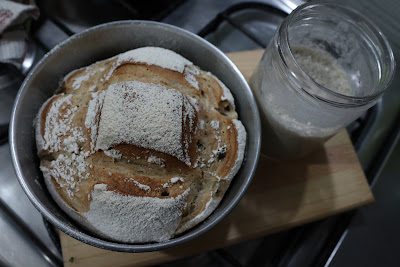Why Bread Smells Like Vinegar - Causes
At some point, we've all experienced the disappointment of baking a fresh loaf of bread only to be hit with a strong vinegar smell when we take it out of the oven. The first reaction might be to throw the loaf away, but before you do that, let's dive deeper into why your baking bread smells like vinegar.
There are a few potential reasons why your bread might be smelling like vinegar. Let's explore each one in detail.
Overactive Yeast
Yeast is a critical ingredient in bread baking because it helps the dough rise and creates that fluffy texture we all love. However, if there is too much yeast, it can overreact, causing the bread to smell like vinegar. Additionally, yeast can create acetic acid, which is the same compound responsible for the sourness in vinegar.
To avoid this issue, ensure that you're measuring your yeast accurately and following the recipe's instructions. If you're using active dry yeast, make sure that it's fresh and hasn't expired. Lastly, don't rush the dough's rising time as this can cause the yeast to overreact.
Fermentation
Bread dough is made up of water, flour, yeast, and sometimes sugar, and these ingredients can ferment when left out for too long. The fermentation process can create acetic acid, which is why you might be experiencing a vinegar smell in your bread.
To avoid this issue, make sure to follow the recipe's instructions precisely and don't leave the dough out for an extended period. If the recipe calls for a longer fermentation time, make sure to monitor it closely and don't let it go beyond the recommended time.
Spoiled Flour
Flour is another critical ingredient in bread baking, and using spoiled flour can cause your bread to smell like vinegar. When flour is exposed to moisture, it can develop mold, which can cause the flour to spoil and create an unpleasant odor.
To avoid this issue, make sure to store your flour in an airtight container and keep it in a dry place. Additionally, check the expiration date on your flour before using it and give it a sniff to ensure that it doesn't have any off odors.
Bacteria
Lastly, bacteria can also be a culprit in creating a vinegar smell in your bread. This is especially true if you're using a sourdough starter, which is essentially a mixture of flour and water left out to ferment for an extended period. The fermentation process can create lactic and acetic acid, which can give the bread a sour or vinegar-like smell.
To avoid this issue, ensure that you're maintaining a clean environment when baking bread. Additionally, make sure to monitor your sourdough starter and discard it if it starts to develop any off odors.
In conclusion, baking bread that smells like vinegar can be disappointing, but it doesn't necessarily mean that your bread is ruined. By understanding the potential causes, you can take the necessary steps to prevent it from happening in the future. Remember to measure your ingredients accurately, follow the recipe's instructions precisely, and maintain a clean baking environment, and you'll be on your way to baking delicious bread with a pleasant aroma.

